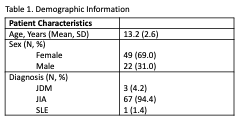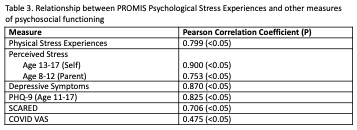Session Information
Session Type: Poster Session A
Session Time: 6:00PM-7:00PM
Background/Purpose: Mental health problems are common in children with pediatric rheumatologic diseases (PRDs) and are associated with worsened quality of life and poorer disease-related outcomes. Psychological distress results from exposure to stress, may be exacerbated in response to traumatic events (e.g., COVID-19 pandemic), and can lead to significant mental health problems. We aimed to determine the rates of psychological stress in PRDs and assess relationships to other measures of psychosocial functioning including anxiety, depressive symptoms, and COVID-related distress.
Methods: Eligible patients in this ongoing cross-sectional study are between 8-17 years and enrolled in the CARRA Registry with a diagnosis of JIA, jSLE, or JDM at one of 3 centers. Consented participants completed a one-time survey during a scheduled rheumatology visit, including Patient-Reported Outcomes Measurement Information System® (PROMIS) measures for psychological stress, physical stress, and depressive symptoms, in addition to the NIH-Toolbox Perceived Stress survey, clinically validated measures of depression (PHQ-9) and anxiety (SCARED), a visual analog scale for COVID-related distress, and a questionnaire to assess acceptability of mental health screening. Descriptive statistics were used for patient characteristics. The proportion of patients with a positive screen based on clinical cutoffs was determined for each measure. For the PROMIS and NIH-Toolbox measures, 1 standard deviation above the mean of the reference population (T-score 50) indicated high levels of that measure. The relationship between psychological distress and other measures was determined by Pearson Correlation Coefficient.
Results: The 71 patients who completed the survey had a mean age of 13.2 years (SD=2.6) and a diagnosis of JIA in 67 (94%) (Table 1). Psychological stress experiences were elevated in 39% and physical stress experiences in 43% (Table 2). High levels of perceived stress were reported in 26% of patients aged 13-17 years and 15% of those aged 8-12 years. While increased depressive symptoms were seen in only 26% on the PROMIS measure, 54% of patients had a positive PHQ-9 depression screen. Half of the cohort had SCARED scores concerning for anxiety disorder. A majority of patients endorsed mild distress from the COVID-19 pandemic (median 2, IQR 0,5); only 4 (6.0%) endorsed severe distress. Psychological stress was highly correlated with physical stress, perceived stress, depressive symptoms (PROMIS and PHQ-9), and anxiety (Table 3). Patients felt ready to discuss mental health with their rheumatology provider (72%) and moderately confident in discussing mental health concerns (73%).
Conclusion: Children with PRDs experience greater psychological distress that is related to physical stress, perceived stress, depressive symptoms, and anxiety. Patients want to and feel confident discussing mental health concerns with their rheumatology providers. Next steps include expanding this cohort to include increased patients with JDM and jSLE and determining the relationship between mental health symptoms and health-related outcomes including disease activity measures.
 Table 1. Demographic Information.
Table 1. Demographic Information.
 Table 2. Patient-Reported Outcomes
Table 2. Patient-Reported Outcomes
 Table 3. Relationship between PROMIS Psychological Stress Experiences and other measures of psychosocial functioning
Table 3. Relationship between PROMIS Psychological Stress Experiences and other measures of psychosocial functioning
To cite this abstract in AMA style:
Rosenwasser N, Rubinstein T, Knight A, Cunningham N, Hersh A, Del Gaizo V, Treemarcki E. High Levels of Psychological Distress, Depression, and Anxiety Symptoms in Children with Pediatric Rheumatologic Diseases [abstract]. Arthritis Rheumatol. 2023; 75 (suppl 4). https://acrabstracts.org/abstract/high-levels-of-psychological-distress-depression-and-anxiety-symptoms-in-children-with-pediatric-rheumatologic-diseases/. Accessed .« Back to 2023 Pediatric Rheumatology Symposium
ACR Meeting Abstracts - https://acrabstracts.org/abstract/high-levels-of-psychological-distress-depression-and-anxiety-symptoms-in-children-with-pediatric-rheumatologic-diseases/
